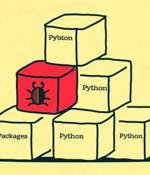Security News

The North Korea-linked threat actor assessed to be behind the massive Bybit hack in February 2025 has been linked to a malicious campaign that targets developers to deliver new stealer malware...

Cybersecurity researchers have uncovered malicious libraries in the Python Package Index (PyPI) repository that are designed to steal sensitive information. Two of the packages, bitcoinlibdbfix...

A malware campaign has been observed delivering a remote access trojan (RAT) named AsyncRAT by making use of Python payloads and TryCloudflare tunnels. "AsyncRAT is a remote access trojan (RAT)...

The maintainers of the Python Package Index (PyPI) registry have announced a new feature that allows package developers to archive a project as part of efforts to improve supply chain security....

Cybersecurity researchers have exposed a new campaign that targets web servers running PHP-based applications to promote gambling platforms in Indonesia. "Over the past two months, a significant...

Cybersecurity researchers have detailed an attack that involved a threat actor utilizing a Python-based backdoor to maintain persistent access to compromised endpoints and then leveraged this...

The administrators of the Python Package Index (PyPI) repository have quarantined the package "aiocpa" following a new update that included malicious code to exfiltrate private keys via Telegram....

Cybersecurity researchers have discovered two malicious packages uploaded to the Python Package Index (PyPI) repository that impersonated popular artificial intelligence (AI) models like OpenAI...

Cybersecurity researchers have discovered a new malicious Python package that masquerades as a cryptocurrency trading tool but harbors functionality designed to steal sensitive data and drain...

The static analyzer uses Claude AI to identify vulns and suggest exploit code Researchers with Seattle-based Protect AI plan to release a free, open source tool that can find zero-day...